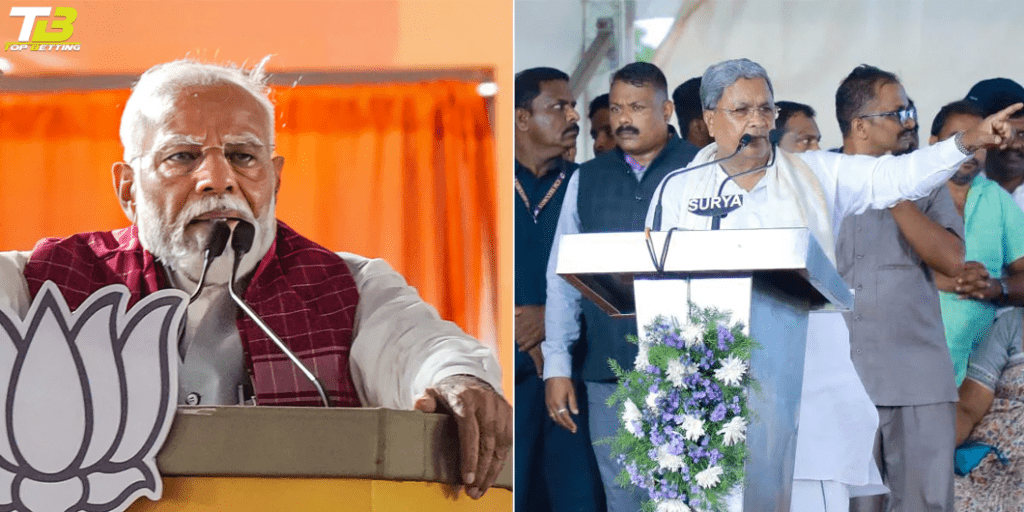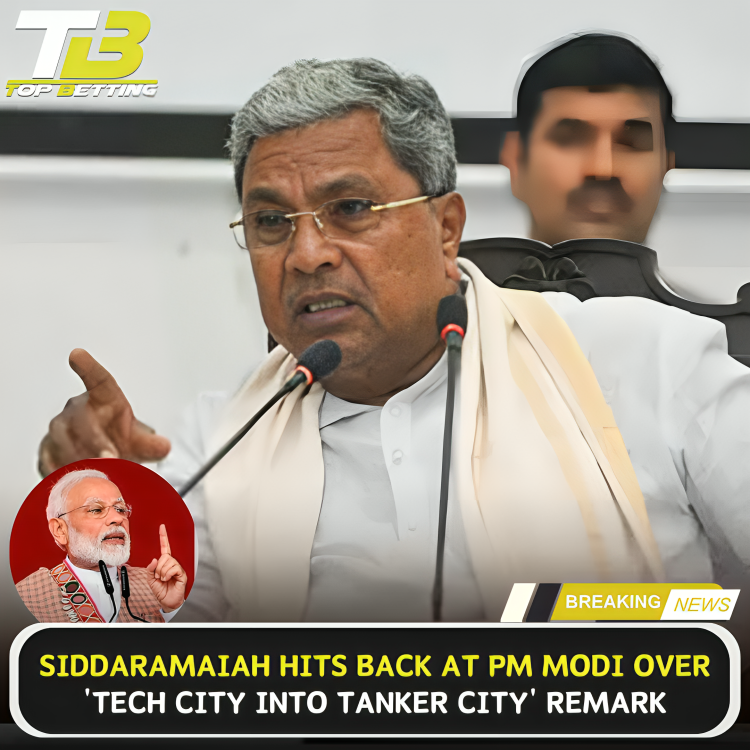
Siddaramaiah hits back at PM Modi
He even reminded Modi that land grab and denotification charges had resulted in the imprisonment of previous Chief Minister B S Yediyurappa and other cabinet members.
Karnataka Chief Minister Siddaramaiah criticised Prime Minister Narendra Modi on Saturday for his comment about turning Bengaluru from a “tech city to tanker city,” and he laid the blame for the current water issue on the previous BJP and JD(S) governments.
He even brought up to PM Modi the fact that during the 2008–2013 BJP government, denotification and land grab cases resulted in the imprisonment of former Chief Minister B S Yediyurappa and a few members of his cabinet. The chief minister emphasised in a statement that contractors were allegedly paid “40 per cent commission” by the BJP government in exchange for carrying out projects.
People still recall how, up until about a year ago, Siddaramaiah stated that the BJP government’s purported 40% commission demand and unwillingness to invest in infrastructure improvements drove away investors and big enterprises from Bengaluru. He said that businesses like Foxxconn, Ola, and others have left Bengaluru as a result of the BJP’s supposed failings. “Mr. Narendra Modi, remember that it was your administration that refused to give more water from the Cauvery during times of crisis and gave “Chombu” when asked to approve the Mekedatu Project, which could have given Bengaluru more drinking water.”
The adjoining Tamil Nadu government has resisted the Karnataka government’s desire for a balancing reservoir across the Cauvery river at Mekedatu near Kanakapura in the Ramanagara district. “The Congress party did not transform Tech City into a ‘Tanker City.'” Sadly, the BJP and JD(S) governments have driven our Tech City into dryness since 2006, despite our leadership making it into India’s Silicon Valley,” he remarked.
Former Chief Minister B S Yediyurappa and his successors are undoubtedly aware of the party that used tankers in Bengaluru for financial and personal advantage, Siddaramaiah noted, adding that the people of Karnataka are fully aware of this. He clarified that the BJP-JD(S) coalition government combined 110 villages into the Bangalore Metropolitan Area without sufficient planning for water and sanitation in a drive to profit from land grabs and a series of denotifications.
Siddaramaiah pointed to Yediyurappa and his cabinet colleagues’ incarceration on corruption-related charges and remarked, “We also know how many went to jail due to denotification and land grab issues during 2008–13.” “But sadly, you will not get another chance from the people of Bengaluru,” Modi joked after having the opportunity to approve the Mekedatu project.
Former Karnataka Chief Minister Siddaramaiah responded strongly to Prime Minister Narendra Modi’s recent comment regarding the transformation of Bengaluru from a “tech city into a tanker city.” Siddaramaiah’s rebuttal came during a press conference where he addressed Modi’s remark and criticized the Prime Minister’s understanding of the issues facing Karnataka’s capital city.
In his response, Siddaramaiah highlighted the significant contributions of Bengaluru to India’s technology sector, emphasizing its status as the country’s leading IT hub. He refuted Modi’s portrayal of Bengaluru as a “tanker city,” asserting that such a characterization was misleading and failed to acknowledge the city’s pivotal role in driving India’s economic growth.
Siddaramaiah further criticized the Modi government’s handling of various crises in Karnataka, including the water scarcity issues that have affected certain regions. He accused the central government of neglecting its responsibilities and failing to provide adequate support to address the challenges faced by the state.
The former Chief Minister also took the opportunity to highlight the achievements of the previous Congress-led government in Karnataka, citing initiatives aimed at promoting economic development, infrastructure improvement, and social welfare. He asserted that the Congress party had made significant strides in addressing the needs of the people and fostering inclusive growth across the state.
Siddaramaiah’s rebuttal to Modi’s remarks underscores the political tensions and rivalries that exist between the Congress party and the Bharatiya Janata Party (BJP) in Karnataka. The exchange reflects the broader contestation of narratives and ideologies between the two major political parties, particularly in the run-up to upcoming elections.
The war of words between Siddaramaiah and Modi is indicative of the competitive nature of Indian politics, where leaders often engage in rhetorical battles to gain public support and sway public opinion. The exchange also highlights the significance of Bengaluru as a political battleground, given its economic importance and demographic diversity.
As the political discourse continues to evolve, it remains to be seen how Siddaramaiah’s response will resonate with the electorate and shape the narrative leading up to the next electoral cycle. With both the Congress and the BJP vying for supremacy in Karnataka, the political landscape is likely to remain dynamic and highly contested in the months to come.

In conclusion, Siddaramaiah’s forceful rebuttal to Prime Minister Modi’s comment reflects the ongoing political rivalry between the Congress and the BJP in Karnataka. The exchange underscores the importance of Bengaluru as a key battleground in Indian politics and highlights the broader contestation of narratives and ideologies between the two major political parties. As the political discourse intensifies, the outcome of this rhetorical battle will undoubtedly have implications for the electoral landscape in Karnataka and beyond.











